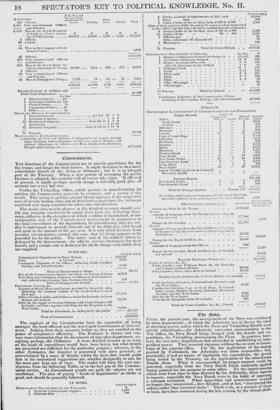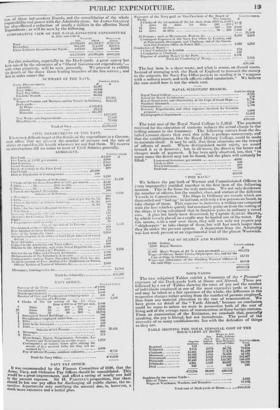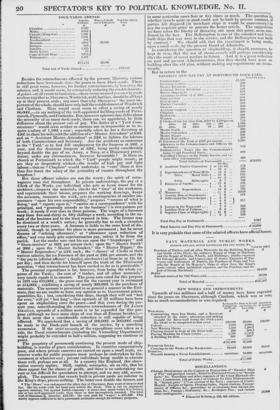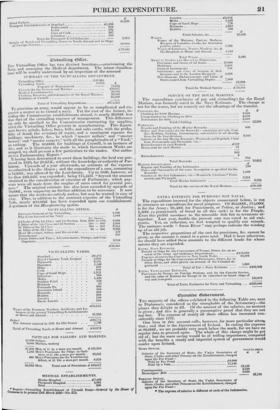ebe gain). UNTIL the present year, the management of the
Navy was conducted by three departments ; of which the Admiralty was in theory the chief or directing power, and to which the Navy and Victualling Boards were strictly subordinate,-the Admiralty somewhat corresponding to the War Office, the Navy Board being charged with the details and ex- penditure, the Victualling provisioning the Fleet. In practice, how- ever, the two latter departments had succeeded in establishing an inde- pendent power. They incurred expenses without the consent or know- ledge of the superior office. For the due application of the money granted by Parliament, the Admiralty was alone responsible; but, practically, it had no means of regulating the expenditure, the grants being issued by the Treasury, on the application of the subordinate Boards alone. When it was expended, no proper account could be procured, especially from the Navy Board, which uniformly applied money granted for one purpose to some other. To the improvements which were from time to time directed by the- Admiralty, these imperks in imperio, especially the Navy Board, were in the habit of opposing a constant resistance. When opposition and remonstrance availed no longer, they temporized-they delayed-and at last, "interpreted the orders, rather than executed them." The& evils, or a portion of them at least, have been removed during .the late. session, by the-virtual aboli-
tion of these independent Boards, and the consolidation of the whole responsibility and power with the Admiralty alone. Sir JAMES GRAHAM has also effected a reduction of nearly a million in the effective Naval Expenditure ; as will be seen by the following
COMPARATIVE VIEW OF THE NAVAL EFFECTIVE EXPENDITURE in. 1831 and 1S32-3.
Voted for DetreM0 in
1031. 1133e-3. 11132-3.
Nary £2,966,691 £2,265,977 £700,714 Victualling 905.139 674,328 230,811 Extra. Estimate for services not Naval 406,630 335,000 51,630 £4,278,510 £3,295,305 £923,203
For this reduction, especially in the Dock-yards, a great outcry Las been raised by the advocates of a "liberal Government expenditure,"--. with what propriety, will be seen presently. We proceed to exhibit the details of the above three leading branches of the Sea service ; and first in order conies the
SUMMARY OF TIIE NAVY.
Voted for 5832-3.
Civet DE RT x PA
MENTS. .*.
Admiralty 42,267 Navy Office 45.630 Navy Pay Office 30,356
Scientific Branch 20,051 NAVY. 133,304 Wages of Seamen and Marines, and for Vessels in Ordinary 923,175 Doek-varas-
At Home £ 541,675 Abroad 49,115 Materials 457,207 -- 1,047,997
New Works and Improvements 77,000
Miscellaneous 79,453 Total of Navy £2,265,929 CIVIL DEPARTMENTS OF THE NAVY.
It is so very difficult to get at the details of the expenditure in a Govern- ment office, that we present the number of persons and the rate of salaries at considerable length wherever we can find them. We reserve our observations till we come to treat of Civil Salaries generally.
ADMIRALTY.
Total for Admiralty £42,267 NAVY OFFICE.
Voted for 1132-3.
Surveyor of the Navy X 1,000 Accountant-General Storekeeper-General 1,000 1,000
Receiver of Fees and Paymaster of Contingencies 400 £ Salaries of 4 Persons
3,400
4 Clerks of the 1st section of the lot class, from X 600 to X 800 per ann. 2,980 7 Ditto 26 .. 500 .. 650 .. 4,230
94 Ditto 20 .. 300 .. 500 .. 9,600 '74 Ditto 30 .. 90 .. 300 .. 16,925
1 Surveyor of Naval Buildings 700
1 Draughtsman employed under him 400 1 Ditto 130
1 Ditto to the Surveyors 400
1 Ditto 200
Salaries of 114 Persons 35,485
1 Messenger 200
• 6 Ditto 573 Housekeeper, Porter, Bargemaster. Servants, La-
bourers, and Watchmen, on weekly wages 1,970 Contingencies of various kinds after abating the amount of fees remised (why are they not ac- counted for?) 4,000 Pay of inferior Persons, numbers unknown 6,745 Total for Navy Office X 45,630 - NAVY PAY OFFICE.
It was recommended by the Finance Committee of 1828, that the Army, Navy, and Ordnance Pay Offices should be consolidated. This Would be a great improvement, and effect a saving of nearly one half In the present expense. Sir H. PARNELL'S proposition, that there Should be but one pay office for discharging all public claims, the re- spective departments only certifying the amount due, is, however, a much more extensive and a better plan.
Voted for 1032-3. First Lord £4,500 X Five Lords, at 1,0001. per annum 5,000
First Secretary 2,000 Second Secretary 1,500 Private Secretary to the First Lord 300 Chief Clerk X1,000 Ditto as Paymaster of Contingencies 150 - 1,150 Salaries et' 10 Persons
7 Clerks of the lot class, from SON. to 5301. per annum .... 5,150
6 Ditto ffil 3301. to 550/. 9,460 12 Ditto 3d 100/. to 3501. 1,920 1 French and Spanish Translator 100 Salaries of 26 Persons 1 Messenger 250 4 Ditto rich at per (lay 9s. 72, 600 1 Ditto to the Office of Private Secretary Gs. 52. WO 0 Porters 3s.22. 99 1 Ditto (far Greenwich lIospital famines-) 30 2 Wat einem 5 I
Necessary Woman tar :,,e4' a ad Servants 150 Allowance 11.ir Cleanidg Books '30
Printer 120
I Bargemaster and Coxswain 30
Pa, o: upwards of 14 Persons Vice-Admiral of Great ltili ara 469 Rear-Admiral of Great Britaia 370
Judge of the Admiralty Court 2,500 Advocat e-G mend or ilk:, Office of Lord High Admiral of Great
Britain 13 Judge-Advocate 182 Counsel to the Admiralty and Navy Offices 100
Solicitor to the Admiralty, and other Naval Departments 1,600 Salaries of 7 Person • Solicitor for an Office and Clerical Assistance 1,000 Disbursements of the Solicitor in Lawsuits 4,500 Contingencies; such as Taxes, Parochial Rates, Fuel, &c., See 4,000
In aid on account of Fees abolished ffir Mediterranean Passes, Officers' Letters of Leave of Absence, Sze. 2,000 -- Allowances, Contingencies, Sec 11,500 14,450 e,630 1,433 5,234
Treasurer of the Navy paid as Vice-Pres:dent of the Board of Voted for 1882-3. Trade. Per Annum. X 5 Clerks of the 1st section. of the 1st class. from £600 to .6800 1 , 8 ,
3 ditto '24 ditto let ditto 500 .. 650 1 -''' 25 ditto 24 class 300 .. 500 9,000 44 ditto 3d ditto . 90 .. 300 7,400 X - 91,200
39 Persons; such as Messengers, Porters, Sze. 2,463 9,463 Contingent Expenses of the Navy Pay Office in Loudon, and at Portsmouth, Devonport, and Chatham, and of the Green- wich Out-Pension Office on Tower MR 4,363 4,363 Conductors of Money-
1 Chief Conductor in London 075 1 Conductor at Chatham 150 Expense of sending Money to the Ports 2,100 Total for Conducting of Money 2,523 £30,356
The last item is a sheer waste, and what is worse, an absurd waste. Instead of arranging with the Bank of England to transmit the money to the outports, the Navy Pay Office persists in sending it in "waggons with a military escort, and with officers called conductors." We believe the sum stated here is not the whole cost.
NAVAL SCIENTIFIC BRANCH.
The total cost of the Royal Naval College is 7,595/. The payment received for the education of students reduces the actual charge to the trifling amount in the Summary. The following extract from the de- tailed account shows that even this trifle is perhaps unnecessary, and that the establishment, like the Royal Military College, could be made to maintain itself. It may be said, that these situations are the reward of officers of merit. 'Where distinguished merit exists, we would reward it as it deserves ; but, in all cases, the direct is the better and cheaper mode of payment. It has been aptly observed, too, that "in many cases the desert may not be found, but the place will certainly be filled." Lieutenant Governor, per annum £800
Clerk to ditto 150 Two Lieutenants 400 Professor 700 £2,050 "THE NAVY."
We believe the pay both of Warrant and Commissioned Officers is (very improperly) jumbled together in the first item of the following account. This is far from the only omission. We not only desiderata the number of officers, but the number, class, and station of the different Vessels in Commission. The Ships in Ordinary are vessels which are dismantled and "laid up" in harbour, with only a few persons on board, to take charge of them. This expense is, however, a trifling one compared with the loss which is quietly but constantly going on from the rotting of the ships, it being calculated that in fourteen years in ordinary a vessel rots. A plan has lately been discovered, by Captain SAMUEL attowa, by which vessels placed on a cradle may be hauled out of the water. By this means, with a roof over them, they will not only not require any " shipkeepers" to take charge of them, but will last much longer than they do under the present system. A deputation from the Admiralty was last week present at an experimental trial of the plan at Woolwich.
PAY OF SEAMEN AND MARINES. 18,000 Sailors. 9,000 Royal Marines.
97,000 Men's Wages, at £2 7s. a man per month 851,175 Wages of Officers, Boats' Crews, SItiiikeepers, &c., and for the Care Ca of Ships in Ordinary 13,111 'Wages and Allowances of the Standing Warrant Officers of the said Ships 58,829
£923,175 DOCK-YARDS.
The two subjoined Tables exhibit a Summary of the "Personal" expenses of the Dock-yards both at Home and Abroad. These are followed by a set of Tables showing the rates of pay and the number of individuals employed at one of the most expensive yards at home ; and may be taken as a fair specimen of the whole, the difference in the respective charges rather arising from the number of persons employed, than from any material alteration in the rate of remuneration. We have given no detail of the "Yards Abroad," because no conclusion could be come to unless we were in possession both of the cost of living and of the average rates of remuneration at those foreign stations. From an examination of the Estimates, we conclude that, generally speaking, the pay is liberal, but not immoderate. The proof of the necessity of so many establishments lies with the defenders of things as they are.
TABLE SIIOWING TIIE TOTAL PERSONAL COST OF THE DOCK-YARDS AT HOME.
Wages to Arti- Day Seers, Labour. Pay of ers, Convicts,
teSlr- Inferior Navy'fronspts, Voted for 1133S-II. inene. Officers. A Yard Crafts. Total. Deptford 519 519 Woolwich 9,875 2.073 53',:7.3). 70,684
Chatham 13.441 3,619 77.379 94,439
Sheerness 10,193 1,942 31,056 43,191 Portsmouth 16,662 ea 0.78 142.467
Plymouth 16,440 146.2S0
Pembroke 4,841 1,222 23,697 29,760
853 .... 527 780 £72,224 29,882 436,015
Sundries for the various Yards- Hire of Teams 3,055 Wages to Watchmen, Warders, and Rounders 10,5ffi0.
Total cost of Dock-yards at Home.... ...X541,675 Royal Naval College School for Naval Architecture Royal Observatory and Observatory at the Cape of Good Hope Nautical Almanaek •
Chronometers Rewards, Experiments, and other expenses incurred for Scientific
purposes
Ilydrographieal department
Voted for 18324. £595 370 3,779 1,100 1,700
1.000 11,507 £20,051 .Voted fo r13954.
DOCK-YARDS ABROAD.
Wages of Artiti- Voted for 1832-3. t eturnr . eers Labourers. Total,
Gibraltar 1,052 Malta 4,044
Canada (Kingston) 1,161
Halifax 1,031
Newfoundland
104
Bermuda 4,602 32,000 Antigua 210 Jamaica 1,825 Sierra Leone 10 Cape of Good Hope 1,615 Trincomalee 1,461
£17,115 32,000 Total cost of Yards Abroad £49,115
Besides the retrenchments effected by the present Ministry, various reductions have been made since the peace in these Dock-yards. There is still great room, however, for further retrenchments, by lowering the salaries, and, it would seem, by extensively reducing the establishments. A priori-at all events to landsmen-there seems no good reason why yards so close together as Sheerness, Woolwich, and Chatham, should be all kept up at their present scale ; any more than why Sheerness, ,0 the most im- portant of the whole, should have only half the establishment of Woolwich and Chatham. Here would seem room to effect a saving of nearly 80,000/.,-to say nothing of the well-appointed building-yards of Ports- mouth, Plymouth, andPembroke. .13itt, however opinions may differ about the necessity of so many dock-yards, there can, we apprehend, be little difference about the present rate of pay. The duties of a "Yard Corn- missioner" would seem neither so onerous nor so responsible as to re- quire a salary of 1,1001. a year ; especially when he has a Secretary at 4501. to share his toils,with the addition of a" Master-Attendant" at 650/. and an " Assistant Master-Attendant" at 2201. to lighten the labours of both Commissioner and Secretary. Are the accidents so numerous in the " Yard," as to find full employment for the Surgeon at 500/. a year, and the Assistant Surgeon at 2201., being pretty considerably beyond double the pay of an Army, a Navy, or a Dispensary practi- tioner, under any circumstances, however favourable ? Is there no church at Portsmouth to which the "Yard" people might resort; or are they so desperately wicked-the results of high pay and light labour-that no "Chaplain" would undertake to "cure" them at less than five times the salary of the generality of curates throughout the kingdom ? But these officers' salaries are not the worst ; the spirit of extra- vagance runs riot throughout. In private undertakings, the pay of a Clerk of the Works (an individual who acts as locum tenens for the architect-inspects the materials, cheeks the "time" of the workmen, and superintends their labour, prepares the working drawings, keeps the accounts, measures the work, acts in contingencies of smaller im- portance "upon his own responsibility," prepares "returns of what is doing," and "reports upon it," "carries on a correspondence" with his principal, and "generally attends to the business") is two guineas per week; it rarely if ever rises to three guineas. The wages of a foreman vary from five-and-thirty to fifty shillings a week, according to the na- ture of the business and to the trust reposed in him. The former may be dismissed at a week's notice ; he generally has to seek a situation every two or three years. A foreman is liable to the same kind of dis- missal, though in practice his place is more permanent ; but he never dreams of "retiring allowance," or "allowance upon reduction of office," and very rarely gets superannuation pay, unless it be from the parish. Let the reader now cast his eye upon the " Storekeeper " and "Store-receiver" at .600/. per annum each ; upon the "Master Smith" at 260!.; upon the "Muster Sailmaker," the "Master Rigger," the "Master Ropemaker," at 2501. each ; the "classes" of Clerks at their various salaries, the ten Foremen of the yard at 250/. per annum, and the "day pay to inferior officers" (Anglice, mechanics) at from 5s. to 12s. 6d. per day; and then decide for himself upon the truth of the Ministerial assertion, "that retrenchment has been carried as far as is practicable."
The personal expenditure is far, however, from being the whole ex- pense of the Yards ; the cost of " timber, and all other materials," very nearly equals it in amount. The gross sum voted for this purpose in 1831 was 819,000!.; the gross cost for the current year is estimated at 514,0001.; exhibiting a saving of nearly 300,000/. in the purchase of materials. The account is presented in so general a manner in the Esti- mate, that we are unable to form any opinion as to Government prices, quantities, &c. ; but, considering that ships, though they will not "last for ever," will yet "last long"-that upwards of 22 millions have been spent on shipbuilding since the peace-and that even during the pre- sent year, notwithstanding the extensive retrenchments of Sir JAMES GRAHAM, upwards of a million more is to be expended for this pur- pose (although we have more ships of war than all Europe besides),- it does seem that a considerable reduction is still capable of being
effected. We apprehend that a saving of 200,000/. or 300,000/. could be made in the Dock-yard branch of the service, by a searching
economist. If the strict necessity of the expenditure were taken as a rule, the Naval retrenchments (including the Victualling Department) might probably be extended to lief a million, supposing we continue at peace. The propriety of permanently continuing the present mode of ship- building, is worthy of grave consideration. In countries comparatively
poor, and where private concerns are carried on upon a small scale, ex- tensive works for public purposes must perhaps be undertaken by Go- vernment at whatever cost ; private individuals being unable to execute them well, perhaps not at all. In a country like England, this obser- vation scarcely applies. Skill, capital,. enterprise, are so rife, that let there appear but the chance of profit, and there is nO•undertaking too vast or too difficult for speculators to attempt, and we may add, accom- plish. The argument that vessels built in private yards are inferior to the King's ships, proves nothing. The latter cost double the former, and •
The" Howe" was endangered the other day at Sheerness, from want of men to dock her. She lay a tide with her head only within the Dock. This is not an argument against economy, but against foolish economy : it shows how much better it is to have one or two well-appointed yards, titan three or four incompletely manned. The total cost of Sheerness is.- however. £43,191: the sum paid for "wages" is X31,056. This surely appears sufficient to have purchased assistance enough for ordinary purposes. in some particular cases four or five times as much. The question is, whether vessels quite as good could not be built by private contract if parties felt disposed (in merchant ships it would be unnecessary) to pay the requisite price to procure the better article. The suggestions we have taken the liberty of throwing out upon this point, seem con- firmed by the fact. The Bellerophon is one of the soundest and best.. built ships that was ever in the service, and the Bellerophon was hilt by contract.'', We should add, that the experiment is being made, upon email scale, by the present Board of Admiralty. In considering the question of shipbuilding, it should, moreover, be kept in view, that the use of steam-vessels will perhaps considerably alter the mode of naval warfare in future. And it is a great reflection on past and present Administrations, that they should have gone On building after the old plan, without making any experiments on steam. vessels.
But to return to the
SALARIES IND DAY-PAY AT PORTSMOUTH DOCK-YARD. Voted
COMILissi■mer
£1,100
Secretary to ditto
450
Master-A ttetalant 650 Assistant M aster-Attendant 220 Master Shipwrnzlit
650
Assistants to ilit to-2 at 400/
800 Store .rece iver 600
Store-keeper
600 Timber C,,overter 300
Surgeon..
500 Assistant-Surgeon 200 Chaplain 500
11,1o.atselain
Warden 250 200 2 Clerks of the 1st class from £300 to £450 per au. 710
7 ditto 2d ditto 150 .. 300 ..
1,5 16 ditto 3d ditto SO .. 200 .. 2,580 Master Smith 260 Master Sail.maker. 250
Master Rigger 250
Master Hope-maker
250 10 Foremen of the Yard at £250 per annum
Allowance to the Commissioners and Officers for
"01 12 Stationery
Parliamentary Taxes (for the Commissioner's
house?) and Parochial Rates
800 Travelling Charges on the Public Service, and va- rious other contingencies 430 Total Salaries at Portsmouth
- £16,662
2 2 2 2 1 17 1 3 3 1 2 Assistant Timber Converters 1 at I Is. 6.
.. 10 3 Superintendents of Wood Mills .. 12 6
Ditto Metal Mills 1 .. 12 6
.. 10 3
Ditto Millwrights .. 9 7
Foremen of Smiths . 12 6 6 Ditto Rope-makers .. 19 6 Measurers . 11 6
Leading Man of Storehouses .. 7 8 Ditto under the Store-keeper 1 .. 5 0
1 6 1 0 Layers in the Rope-yard . 8 Leading Man of Painters 6 5 Superior Class of Shipwrights 1 .. 11 6 1 "9 7
• • - • • • • • • • • • • • • • • • • •
..
.. .. .. .. .. 179 160 390 195 160 149 195 148 195 3,059 119 211 359 100 179 149 Total Day-Pay at Portsmouth 5,947 Total Salaries and Day-Pay at Portsmouth £22,609
It is very probable that some of the salaried officers have official houses.
NAVY MATERIAL AND PUBLIC WORKS. TIMBER AND ALL OTHER MATERIALS FOR THE FLEET, &C.
Voted for 1832.3.
Purchase of Timber, and all other Materials for the Building, Repair, £ and Outfit of the Fleet; the ordinary Repair of Ships in Harbour, and the Repair of Docks, Wharfs, and Buildings, sundry expenses for Salvage, Repairs, and Conveyance of Stores, Expenses of Pur- veyors and Converters of Timber, the Purchase of Ships and Ves- sels, the Repair of his Majesty's Ships at other than the King's ports, various other incidental expenses, and the Purchase and Re-
pair of Steam Machinery 514,000 Deduct Amount received for Old Stores sold 56,793
Total of Material £457,207
NEW WORKS AND IMPROVEMENTS.
Upwards of two millions and a half of money have been expended since the peace on Sheerness, although Chatham, which was so near, has as much accommodation as was required.
Estimate for Sum to be laid Amount ta Completing out timing the be hereafter the Work. Year Inn. provided'
WooLvvica.
Constructing three Dry Docks, and a Reservoir attached to the same; advancing and making Culvert 3,000 3,000 straight the River-wall 1licing the Dock-yard; the whole to be completed in four years 130,000 30,000 100,000 New Masting Sheers 1,300 1,300 Clearing Gravel in front of the River-wall 500 500 Proving Machine for Chain Cables 1,700 1,700 A Building for ditto 500 500 £137,000 37,000 PLYMOUTH SOUND. 80,048 30,000 50,018 Carrying on the Works of the Breakwater BERMUDA.
Towards forming a Naval Establishment uncertain. 10,000 uncertain.
Total of Public Works £77,000
MISCELLANEOUS.
Pilotage, Head-money on the Capture or Destruction of "Enemies' Ships of War" and piratical vessels ; Relief to Distressed Seamen in "foreign parts," &e. Travelling and other expenses of the Coast Blockade ser- vice; Commission (24. per cent.) to Consuls for their Disbursements in " foreign parts" (?) on account of the Navy ; expenses of Courts- Martial ; Freight of Specie, Floating-lights, Signal-stations, Passage- money of Officers, &e.., proceeding to or returning from foreign sta- tions, Sze.; Postage ; Stationery, &c.; Exchequer Fees ; and various other contingencies * Financial Reform, p.155, 4th edition.
38,98a 18,520 2,953 19,000 £79,453 liked Packets Transport Establishments at Deptford £1,206 Portsr.south 620 Leith 391 Cove of Cork 397 Gibraltar Total for Transport Establishments Freight of Naval :tad Victualling Stores to Yards Abroad and to Ships ou Foreign Stations






















































 Previous page
Previous page